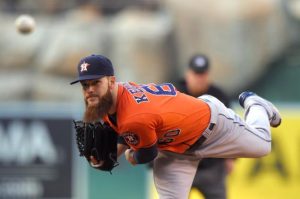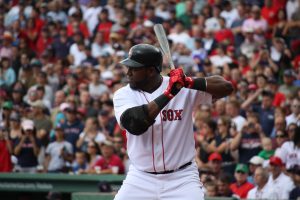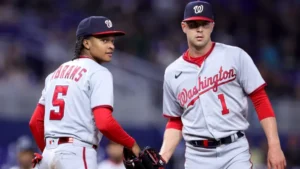The Mid-Cape Highway is the main road on Cape Cod. The long four-lane freeway, turning sharply and often on the map, runs from the Sagamore Bridge to Provincetown—over sandy beaches and green forests, twisting up the hook of the Cape, crossing through the Orleans rotary and past the Wellfleet Drive-In, through the vineyards in Truro, and into the majesty of Provincetown’s lively commercial area. If you pull off at the Orleans rotary—bearing right instead of left—and drive to the heart of this sleepy, 6,000-person town, you find Eldredge Park, home of the Orleans Firebirds.
The first thing you notice sitting behind home plate at Eldredge Park is the dust. An old club car golf cart—caked in layers of dust and grass stains and just minutes from losing its power-steering—lugs the metal drag net to smooth out the infield. It kicks up a hazy layer of dirt that wafts through the jet-black netting behind home plate and settles over the assorted tables, chairs, and laptops. In every nook, in every cranny, you’ll find dust that was once dirt on the field that the Orleans Firebirds call home. They may play in the shadow of Nauset Regional Middle School, but make no mistake—the Firebirds are part of the pre-eminent collegiate summer baseball league in America.
The Cape Cod Baseball League (CCBL) boasts an incredible reputation, with one of every six major leaguers having played for one of ten CCBL teams. The top collegiate players from across the country finish their school seasons and then flock to Massachusetts to play in the CCBL—including Eddie McCabe, a Georgetown alum who played for the league in 2019. The summer season sees 44 regular season games in about 55 days, meaning teams play nearly every day. Players come to compete and chase the dream of making the big leagues. The teams dot Cape Cod, with the easternmost being the Orleans Firebirds. Their home field of Eldredge Park predates both the team and the middle school that towers above the hill just past the first-base side of the field. With no bleacher seating, the majority of fans set up beach chairs and picnic blankets on the hill, coming out as early as eight in the morning to claim a spot for the 6:30 game. And if there was a day to claim a spot, this was the one: June 29th. The Orleans Firebirds would battle the Chatham Anglers in another rendition of the top rivalry in the CCBL.
On the mound for the Firebirds was the towering Bryce Warrecker, a 6’8” two-sport athlete from California Polytechnic State University in San Luis Obispo, California. Making his fifth appearance of the summer, the west coast prospect looked to make a name for himself in front of the thirty MLB scouts in attendance. Following the ceremonial first pitch by a local businessman and a national anthem sung on a blown-out mic by an even-more-local musician, the game was set to begin. The game announcer’s voice crackled over the PA, as the first Angler batter—the left-handed Guy Garabay Jr. out of Rice University—approached the plate. As Garabay Jr. tapped his right toe into the batter’s box again and again, Warrecker received the sign from Texas catcher Garret Guillemette and got into his windup. Thirty scouts lifted their right arms to a 90-degree angle in tandem, radar guns in hand; their left arms were occupied with phones or notebooks filled with statistics.
Warrecker fired a fastball for a strike and a number flashed on all of the radar screens: 91 miles per hour. Nothing special, nothing that would raise any eyebrows, especially coming from a pitcher that size. But his fastball never felt like 91 miles per hour. With that frame and that arm angle, it felt a good deal faster. And he was more than his fastball. He had an arsenal of three off-speed pitches: a slider with a horizontal break that was above-average even by MLB standards, a changeup that was nearly ten miles an hour slower than his fastball, and an emergency curveball that he would use in a pinch. On this cool summer evening, everything was working. He struck out two of the first three batters, getting the other to pop out to the shortstop. In the bottom half of the inning, the Firebirds attacked Chatham’s starting pitcher Wyatt Evans, who was making just his second appearance of the summer. After the leadoff hitter Travis Honeyman grounded out to short, shortstop Luke Keaschall belted a double into the gap in left-center field. Another batter, another groundout, but then the power-hitting Kevin Sim stepped to the plate with two outs and a man still on second. With a 1-2 count, Sim smacked a hanging curveball down the left-field line for a two-run home run. Orleans had jumped to an early 2-0 lead. It was up to Warrecker and the rest of the pitching staff to make sure they wouldn’t relinquish it.
Over the next three innings, Warrecker kept the Anglers at bay, facing the minimum as he struck out four more batters to keep his perfect game alive. Chatham, on the other hand, continued to struggle with the Orleans offense as the Birds knocked in two more runs in the bottom of the 4th. Those two runs, by way of a Garret Guillemette double, chased Wyatt Evans from the game, and relief pitcher Connor Bovair managed to get the next two outs to end the inning. In the top of the fifth, against superstar Angler Caiden Grice, Warrecker went into his bag of tricks. After a slider for strike one, Warrecker unleashed his only curveball of the evening for strike two, freezing Grice as the ball broke right over the middle of the plate. Warrecker used his third pitch of the at-bat, a changeup, to get Grice swinging for the first out of the inning. Matthew Hogan followed and became the second out with a grounder to first base, and Warrecker hit his first snag of the game against the designated hitter Cooper Ingle. After working Ingle to a 1-2 count, Warrecker watched three of his next four pitches sail into the crowd for foul balls before his fastball missed high and outside to fill the count at 3-2. From the bullpen just behind the right field fence and underneath the bandhouse, pitching coach Cole Cook and the rest of the Orleans pitchers looked on in silence. Another foul ball sent the Orleans bullpen pacing, hoping that Warrecker would keep his perfect game alive. Ingle stuck his bat out at a devious 3-2 slider, but the ball bounced harmlessly to shortstop Austin Knight, who made the routine throw to first to end the inning.
In the dugout, pitching coach Jim Lawler approached a sitting Warrecker, clipboard in one hand and bullpen walkie-talkie in the other.
“How ya feeling?”
“I got another inning in me.”
Lawler radioed to the bullpen and said three words. “He’s got another.”
Warrecker returned to the mound for the sixth, and after dusting off the ball, immediately picked up where he left off. After six pitches, he had generated two outs, and Angler catcher Hayden Travinski stepped into the box. His bat didn’t leave his shoulder for the first three pitches, resulting in two called strikes and a ball. But then Travinski began to fight. A foul ball and two throwaway pitches worked the count from 1-2 to 3-2. Warrecker got into his windup, fiddled the ball around in his glove, threw his slider, and got the Angler swinging. Behind the plate, Guillemette released a guttural yell, his body shaking like a jangly skeleton. Warrecker, who had advocated to come back out for a sixth inning of work, knew his day was done. He was perfect through six innings. The fans would clamor for more, but Warrecker had thrown 81 pitches—and this was the Cape League. It was about getting everyone their looks, not about throwing a kid for 100 pitches.
Josh Allen of Duke University would replace Warrecker in the top of the seventh, and Warrecker got his rest. Donye Evans, the 6’6” Vanderbilt pitcher and one of the few men on the team that could look Warrecker in the eye without craning his neck, dapped up his 6’8” counterpart and hit him in the chest a few times while giving him congratulations. Skipper Kelly Nicholson, an old-school coach who despised wearing a hat at a meal or a backwards ball cap, came up and gave his starter a hearty handshake.
Allen struck out the first batter he faced, but hit the next batter to lose the perfect game. The no-hitter survived, however, as Allen got Roc Riggio to ground into a double play.
The sun fell away behind the school, and the film of the synthetic light from the floodlights above made the field glow, so that its dimensions were sharper, the infield dirt gleaned with a red hue, and centerfield—already 434 feet away—had even greater depth. And people were now individuals, not the mass of humanity from before; the hill was still buzzing itself, but the mindless chatter had been replaced by cheers and whispers of the surviving no-hitter. The highway abutting the third-base line, with woods just beyond it, was empty. The Firebirds players, each in their black uniforms and white pants, dirtied from the surfaces they played upon, stood out magically under the lights; these college kids seemed like professionals. Those in the dugout quieted. They ignored impulses which registered only faintly in their minds. Their mouths were quiet, but eyes lively, excited, bright like the lights above that illuminated their dusty faces. They recognized what was at stake, and they had to make conscious efforts to avoid unconscious behavior. Everyone made a silent pact to ignore the scoreboard. Jim Lawler went to speak to Guillemette after the seventh inning, but thought better of it before he could utter a word. Lawler patted Guillemette on the shoulder and walked back towards the other end of the dugout.
Josh Allen pitched a perfect eighth, then handed the ball to closer Harvard sophomore Chris Clark with the no-hitter in the balance. The Harvard man looked shaky to start, hitting the first batter he faced and walking the second, but Clark settled in and got Hayden Travinski to line out to third. A wild pitch against Jake DeLeo allowed the runners on-base to advance, meaning there were runners on second and third with only one out. Clark struck out DeLeo, leaving Thomas Caufield as the last Angler batter. Clark jumped on Caufield immediately, building an 0-2 count. Two balls later, and the count was 2-2. The crowd began to clap. No one was sitting. Clark took in the moment, received the sign, and threw. DeLeo swung through it, catcher Garret Guillemette dropped the ball, but he recovered and threw the ball down to first to record the strikeout.
Game over. The scoreboard read Firebirds 4-10-0; Anglers 0-0-0. Goose eggs for Chatham. A no-hitter for Orleans. The players stormed the field like they had won a national championship, like they had known each other for longer than four weeks. The crowd followed, one of the best parts of the Cape League — fans can interact directly with players after games. Guillemette’s hands were shaking, a symptom of success, as he was surrounded by fans in awe of his catching performance. Warrecker’s height allowed him to tower over the crowd, but he had no escape from the group of fans that quickly engulfed him. There were laughs, cheers, and autograph requests from children. On this night the stars of tomorrow shone as brightly as the ones populating the pitch-black sky above.
And not even 14 hours later, the team boarded the school bus for a game against Brewster. After all, it’s the Cape League. There’s almost always another game tomorrow.






